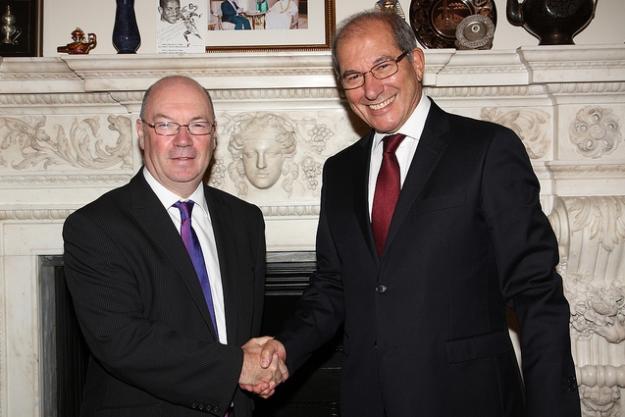
Foreign Office Minister Alistair Burt (left) meeting Ahmet Üzümcü, Director-General of the Organisation for the Prohibition of Chemical Weapons (OPCW) in London, 15 October 2012.
The OPCW Director-General, Ambassador Ahmet Üzümcü, met Foreign Office Minister Alistair Burt during a visit to the United Kingdom on 15 and 16 October 2012. The Hon. Mr Burt currently serves as Parliamentary Under Secretary at the Foreign & Commonwealth Office.
In their meeting, Director-General Üzümcü briefed Mr Burt on a number of challenges related to the future of the OPCW. He provided him an update on preparations that are being undertaken for the Third Review Conference, which will be held in The Hague from 8 to 19 April 2013, and discussed OPCW-related issues and concerns in the Middle East. The Foreign Office Minister reaffirmed the UK’s continuing strong commitment to the Chemical Weapons Convention (CWC) and support for the work of the OPCW.
During his visit to the UK the Director-General also attended a 2-day conference at Wilton Park entitled The Chemical Weapons Convention: Third Review Conference and Beyond [PDF – 35 KB]. The purpose of the conference was to assess the challenges to the chemical weapons prohibition regime and promote frank dialogue on these issues prior to the Third Review Conference.
In his opening remarks, Director-General Üzümcü highlighted two dominant factors that will impact the OPCW in coming years: the Organisation’s imminent transition caused by its success in achieving chemical disarmament, and the circumstances of the global financial crisis.
“The future needs to be viewed not merely from the perspective of cost savings but how the transition can be made smooth and orderly and how the management’s knowledge, experience and responsibility to deliver can be best harnessed,” the Director-General told the conference. “Collaboration rather than prescription, and a pro-active rather than passive approach, must define our collective (efforts) in dealing with the transition.”
The Director-General noted that by 2018 much fewer of the OPCW’s resources will be devoted to verification of chemical weapons destruction activities. The blueprint for the future of the Organisation will have to be established before that, he added, and the opportunity to do so is offered by the forthcoming Review Conference next year.
